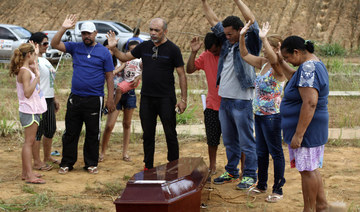KHARTOUM, CAIRO: Short of time to save his sinking economy, Sudan’s President Omar Bashir boarded a Russian jet on Dec. 17 and became the first Arab leader to visit Damascus since 2011, renewing what has been seen as a push for the financial help he needs to survive.
Events at home soon caught up with him. Two days later, demonstrators angered by bread price rises torched the ruling party headquarters in the city of Atbara, setting off two weeks of protests that quickly spread across the country, with crowds calling on Bashir to step down.
The protests are the most sustained challenge to Bashir since he took power in a coup nearly 30 years ago, more widespread and longer-lasting than bouts of unrest in September 2013 and January 2018.
They risk propelling Sudan deeper into crisis, upending Bashir’s attempt to stave off financial collapse and destabilizing a country beset by simmering internal conflicts that straddles Africa and the Middle East.
“What we are witnessing today is the second and stronger wave of the protests that swept Sudan in September 2013. Frustration with the rising cost of living has been building up and is now boiling over again,” said independent analyst Muhammad Osman.
Officials have acknowledged 19 deaths in the demonstrations. Bashir has survived as one of the region’s longest serving leaders, riding out 20 years of US sanctions.
The protests come as the 75-year-old has been pushing to shore up his position economically as well as politically, lobbying to be removed from the list of countries, along with Syria, Iran and North Korea, that the US considers state sponsors of terrorism.
That listing has prevented an influx of investment and financial aid that Sudan was hoping for when the US lifted sanctions October 2017, according to economists.
Spiraling inflation
Instead, Sudan has been rapidly expanding its money supply to finance its budget deficit, causing spiraling inflation officially recorded at nearly 70 percent and a steep decline in the value of its currency.
During his trip to Damascus, Bashir was courting the Russians by helping rehabilitate their ally Bashar Assad after Syria’s civil war in order to win financial support, analysts said.
Bashir has also sought favor with Gulf states including Saudi Arabia and the UE, cutting ties with Iran in 2016 and contributing troops to the Arab coalition in Yemen, even while maintaining close relations with two of their regional rivals, Qatar and Turkey.
“The confusion in Sudanese foreign policy and the shift from one alliance to another is caused by the severe economic crisis in the country and President Al-Bashir wants to obtain quick economic aid,” said Faisal Mohamed Saleh, a journalist and political analyst in Khartoum.
Those economic problems, at the root of discontent that has simmered for years, accelerated after Sudan lost three-quarters of its oil production when the south of the country seceded in 2011.
In the eyes of protesters, the economic troubles are deeply entwined with corruption and mismanagement in the political elite and the ruling National Congress Party (NCP), said Amjed Farid Eltayeb, an activist and spokesman for the Sudan Change Now movement.
“The NCP for the last 30 years have directed most of the national budget to the security apparatus, to the militias, and they cut all the funding of the social services, education, health,” he said.
“So those people who are now in the streets have no social protection nets, they are alone in a battle with fate ... they have nothing to lose.”
Leaderless protests
Opposition parties are emasculated, and the protests so far are leaderless, with demonstrators coalescing in individual towns and neighborhoods, and circumventing blocks on social media to share information on the web.
Chanting the line made famous in the Arab Spring protests of 2011 — “The people want the fall of the regime” — they have continued to rally despite security forces using live ammunition, tear gas, and stun grenades to disperse them.
With Sudan in its worst economic crisis since independence in 1956, Bashir risks the fate of other authoritarian rulers toppled eight years ago unless the NCP switches candidate ahead of elections due next year, said Eltayeb Zine Al-Abedine, a political science professor at the University of Khartoum.
“The economic crisis and public discontent are lessening the chances of President Omar Al-Bashir running for the 2020 elections,” he said.
But Bashir shows no sign of stepping aside. Members of Khartoum’s Parliament, which is dominated by the NCP, proposed a constitutional amendment last month to extend term limits that would have required Bashir to step down in 2020.
Since the demonstrations began, Bashir has appeared largely unperturbed, tempering his talk of conspiracies against Sudan with pledges of economic reform, calls for restraint and the announcement of a fact-finding committee — steps dismissed by protesters as symbolic.
“We are committed to holding free and fair elections in 2020, and we ask that all political powers prepare to participate,” Bashir said on Monday.























